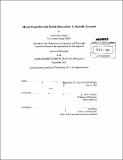Moral expertise and moral education : a Socratic account
Author(s)
Hagen, Daniel Scott
DownloadFull printable version (5.729Mb)
Other Contributors
Massachusetts Institute of Technology. Department of Linguistics and Philosophy.
Advisor
Sally Haslanger.
Terms of use
Metadata
Show full item recordAbstract
What is virtue and can it be taught? These questions preoccupied Socrates and this dissertation offers a Socratic answer to them. In Chapter 1 ("Virtue as Expert Moral Knowledge") I develop and defend a novel interpretation of the Socratic thesis that virtue is a kind of knowledge. I argue that the relevant kind of knowledge of interest to Socrates is expert moral knowledge or moral expertise-a complex epistemic state that integrates practical knowledge, theoretical knowledge, and self-knowledge. This account unifies several seemingly disparate epistemological threads that run through Plato's Socratic dialogues, it helps us resolve other interpretive questions surrounding Socrates and Socratic philosophy, and it is philosophically attractive in its own right. In Chapter 2 ("Socrates the Educator and Socratic Education") I confront a puzzle about Socrates' status as a teacher. It's natural to think of him as one, yet (1) Socrates persistently denies that he is or ever was anyone's teacher, (2) he seems to think knowledge of some sort is necessary for being a teacher while disavowing knowledge himself, and (3) he argues on occasion that virtue-the thing he took to be most important of all-cannot be taught. I use the account from Chapter 1 to resolve this puzzle. I conclude the chapter by considering some of the further benefits of Socratic education and some of the limitations it faces. In Chapter 3 ("Moral Deference and Moral Development") I explore the interaction between expertise and education by examining Socratic policies regarding each. In particular, I consider how Socrates thinks we ought to interact with moral experts, and I consider how he thinks we ought to promote our own moral development (in light of the account of virtue from Chapter 1). I argue that while there appears to be a trade-off between deference and development, Socrates' characteristic method of inquiry, elenchus, offers a way to reconcile the two. I bookend the chapter with a discussion of some recent work in moral epistemology on the puzzle of pure moral deference. The Socratic perspective on deference and development supplies a new diagnosis of this puzzle.
Description
Thesis (Ph. D.)--Massachusetts Institute of Technology, Dept. of Linguistics and Philosophy, 2013. Cataloged from PDF version of thesis. Includes bibliographical references (pages 97-101).
Date issued
2013Department
Massachusetts Institute of Technology. Department of Linguistics and PhilosophyPublisher
Massachusetts Institute of Technology
Keywords
Linguistics and Philosophy.